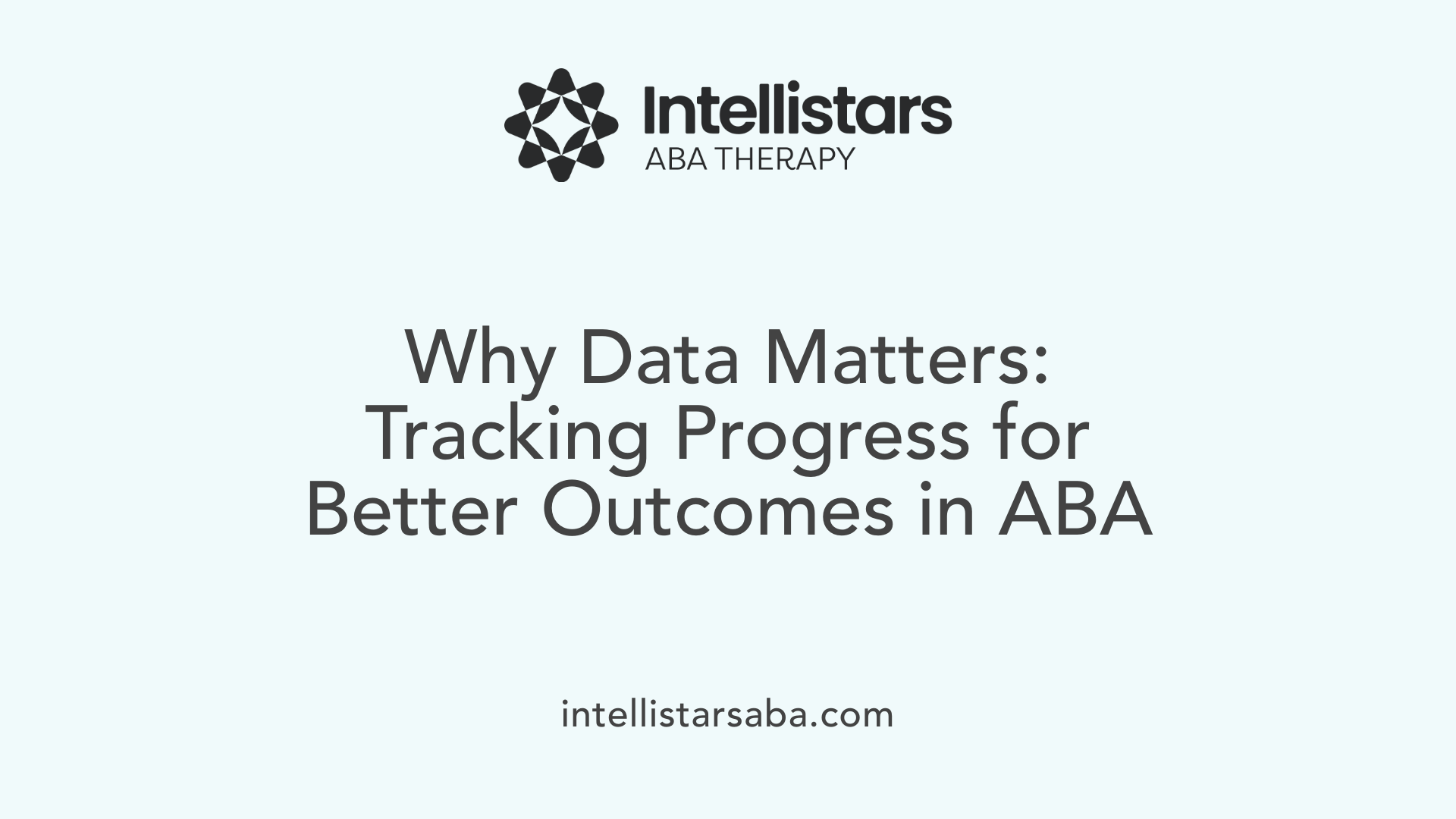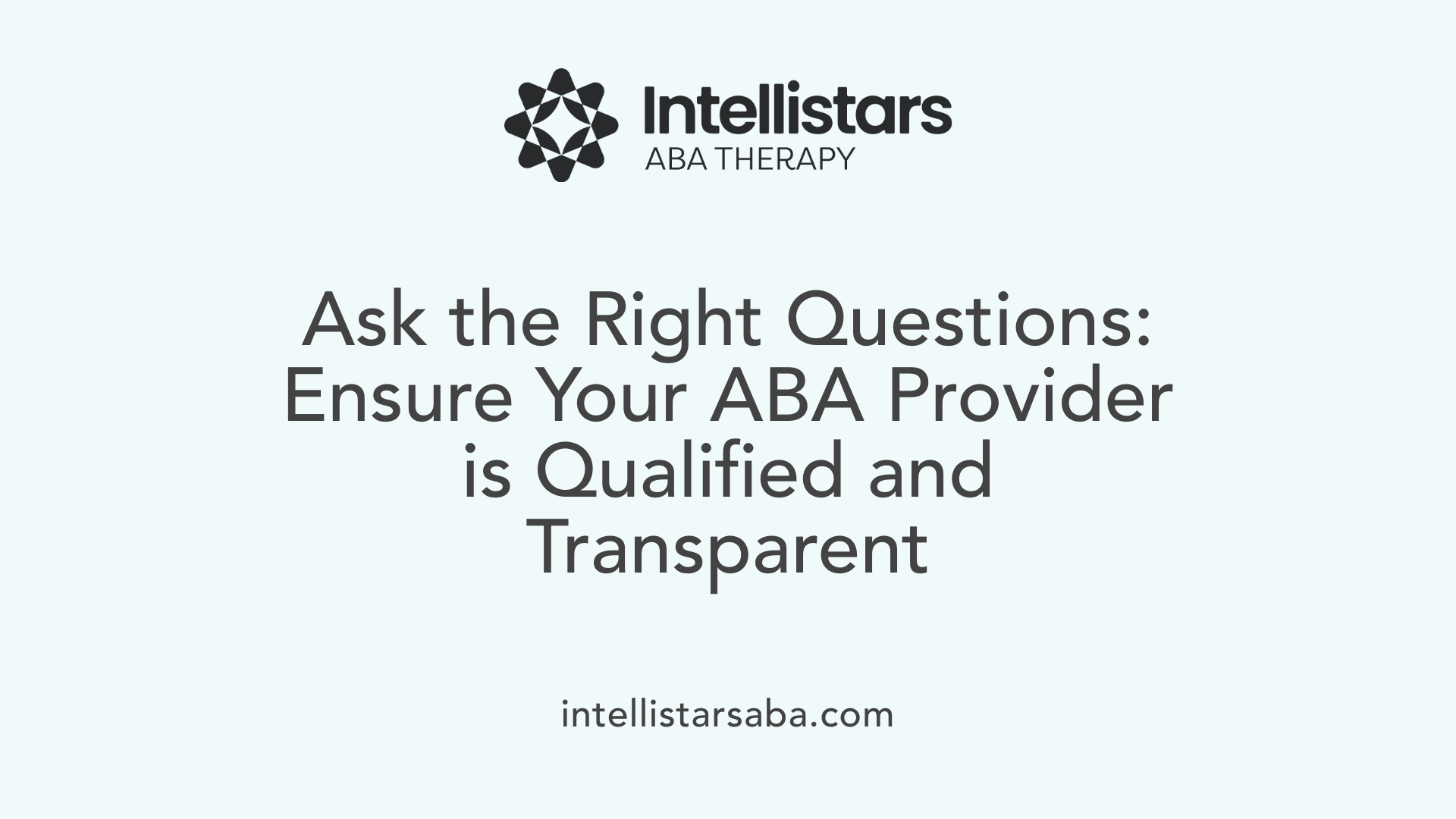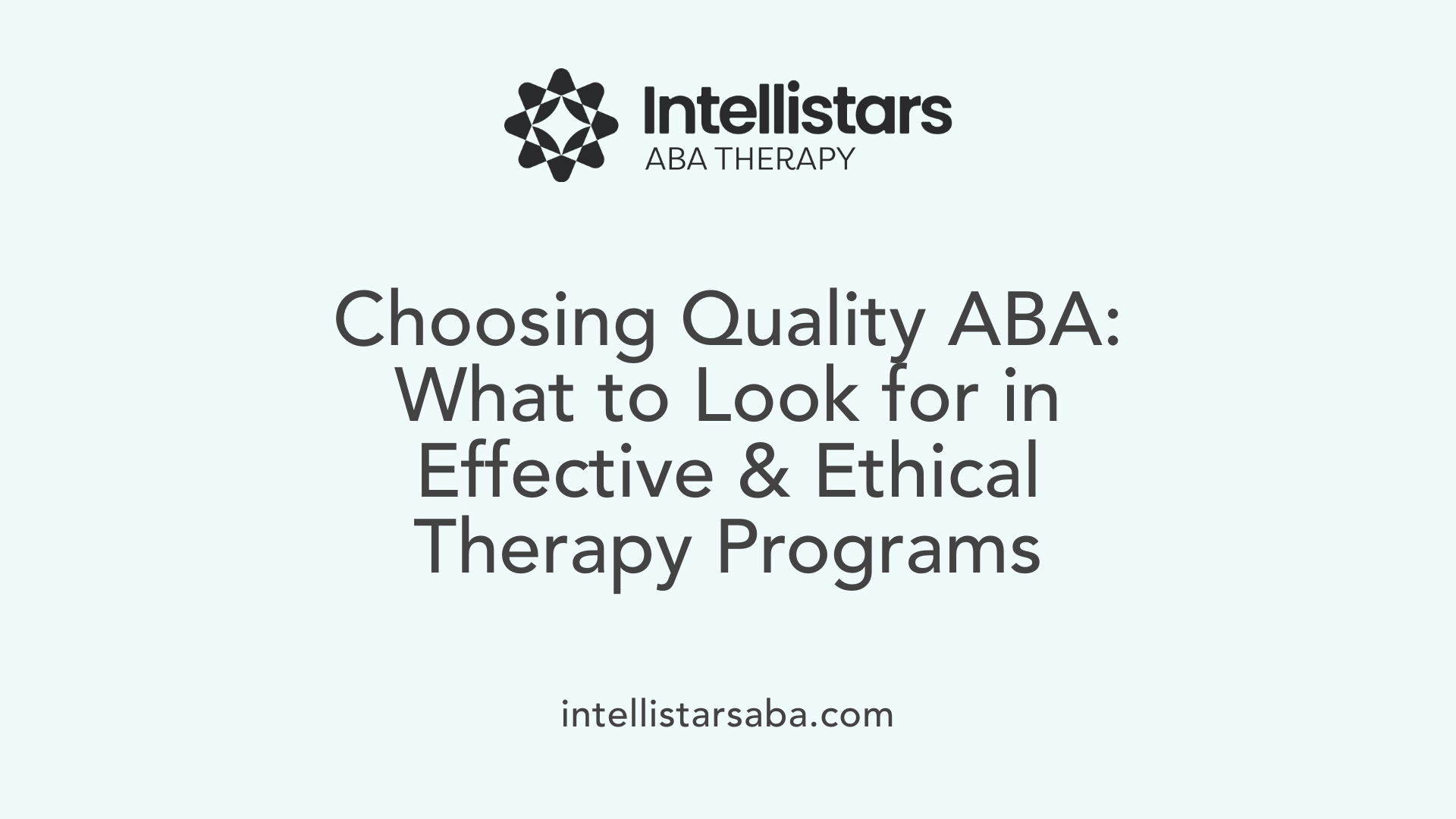Navigating Your Child’s Autism Treatment Options
Choosing an ABA therapy provider is a critical step in supporting a child's development and ensuring effective autism intervention. With numerous providers and varying approaches, understanding what questions to ask and what factors to evaluate can help parents and caregivers make informed decisions. This comprehensive guide covers essential aspects to consider, from qualifications to therapy quality, empowering you to select a provider that aligns with your child's needs and your family’s values.
Understanding ABA and Its Variability

What is ABA?
Applied Behavior Analysis (ABA) is a scientifically supported method used to improve socially significant behaviors in individuals with autism spectrum disorder (ASD). It involves systematically applying techniques and principles based on learning theory to bring about meaningful behavioral change. ABA focuses on reinforcement strategies to increase desirable behaviors and reduce problematic ones, with individualized programs tailored to each child's unique needs.
Variability in ABA practices
While the core principles of ABA are consistent, the approaches and methods can vary significantly between providers. Some programs emphasize naturalistic, play-based, or child-led techniques, which promote the generalization of learned skills to everyday settings. Others might use more structured, clinician-led approaches. It’s essential to understand that ABA is not a one-size-fits-all solution; programs should be personalized based on comprehensive assessments, including functional behavior assessments (FBAs).
Providers should also adapt their strategies to align with family values, cultural preferences, and specific developmental goals. This means that the methods used in ABA therapy can differ from one practitioner to another, and it’s crucial for families to ask about the specific techniques employed and how these align with their expectations.
Why is data collection important?
Data collection is at the heart of effective ABA therapy. Consistent, accurate collection of data allows providers to track progress objectively, make informed adjustments to interventions, and determine if the current strategies are effective. Regular reports should be understandable and transparent, showing measurable improvements over time.
Ideally, data should include information on skill acquisition, behavior reduction, frequency, and intensity of targeted behaviors, and the child's overall engagement in therapy sessions. This data-driven approach ensures that interventions are tailored and flexible, promoting the best possible outcomes.
What is the evidence supporting ABA therapy as an effective treatment option?
Extensive research over the past 40 years demonstrates that ABA is a highly effective therapy for individuals with ASD. Meta-analyses and systematic reviews consistently show improvements in social skills, communication, daily living skills, and behavior management. Early, intensive intervention—usually between 25 to 40 hours per week for 1 to 3 years—has been associated with more significant gains.
Multiple peer-reviewed studies, including randomized controlled trials and single-case experiments, validate ABA's effectiveness across different ages and settings. Recognized by the US Surgeon General and the American Psychological Association as an evidence-based treatment, ABA remains the gold standard for autism intervention. The approach’s foundation in rigorous scientific evidence makes it a reliable choice for supporting individuals with ASD in reaching their full potential.
Key Questions to Ask When Choosing an ABA Provider

What are the key questions to ask when selecting an ABA therapy provider?
Choosing the right ABA provider involves asking crucial questions to ensure your child receives effective and safe treatment. Start by examining the credentials of the staff. Confirm if they have qualified professionals like Board Certified Behavior Analysts (BCBAs) or Board Certified Assistant Behavior Analysts (BCaBAs). It’s also important to inquire about their staff’s training, ongoing education, and experience, especially in evidence-based methodologies such as PRT or VB.
Next, review their approach to therapy. Ask how they develop individualized treatment plans rooted in functional behavior assessments. A good provider should tailor goals to your child's specific needs and focus on behaviors that improve daily life skills like communication and independence. Furthermore, clarify how progress is tracked and whether they use clear, understandable data to guide adjustments.
Understanding the logistics is also essential. Ask about session structure—frequency, duration, and location (whether in-home, in-clinic, or community-based). Confirm their waitlist policies and whether insurance, including Medicaid, is accepted. Be sure to discuss costs and billing practices, including any additional expenses.
Finally, assess their policies on family involvement and staff supervision. An effective provider encourages parental participation, training, and consistent collaboration. Find out if there's a BCBA overseeing treatment and how they support staff development to maintain high-quality care. Asking these questions helps ensure you select a provider committed to a safe, personalized, and transparent therapy process, ultimately supporting your child's growth and well-being.
Qualifications and Background of ABA Therapists

What are the qualifications and credentials of qualified ABA therapists?
To ensure effective and ethical ABA therapy, it is crucial to understand the educational background and certifications of the professionals involved.
Qualified ABA practitioners typically hold specialized credentials. The most recognized certification is the Board Certified Behavior Analyst (BCBA), which requires a master's degree or higher in psychology, behavior analysis, or related fields. Candidates must complete between 1,500 and 2,000 hours of supervised practical experience and pass a rigorous certification exam through the Behavior Analyst Certification Board (BACB).
In addition to BCBAs, some practitioners are Certified Assistant Behavior Analysts (BCaBAs), who have a bachelor's degree and supervised training, or Registered Behavior Technicians (RBTs), who usually have a high school diploma, undergo specific training, and work under supervision.
Maintaining their credentials involves ongoing continuing education and regular supervision to stay updated with current research and best practices.
Licensing requirements can vary by state, but generally include certification, supervised experience, and renewal procedures. Ensuring that your child's ABA provider has qualified staff is essential for safe and effective treatment.
| Certification Type | Educational Level | Supervised Experience | Certification Requirements | Ongoing Training |
|---|---|---|---|---|
| BCBA | Master's or higher | 1500-2000 hours | Pass BACB exam | Yes, continuing education |
| BCaBA | Bachelor's degree | Varies | Pass BACB exam | Yes, ongoing requirements |
| RBT | High school diploma or equivalent | Supervised hours required | Complete training and supervised practice | Required periodically |
Knowing these credentials helps ensure your child is in capable hands, with staff experienced in ethically following ABA guidelines.
Evaluating the Quality and Effectiveness of ABA Services
 When considering ABA therapy for a child, understanding what to look for is crucial to ensure effective and ethical treatment. First, evaluate if the provider strictly follows evidence-based practices. Approved ABA methods are supported by extensive research and include approaches that focus on meaningful, real-life skills.
When considering ABA therapy for a child, understanding what to look for is crucial to ensure effective and ethical treatment. First, evaluate if the provider strictly follows evidence-based practices. Approved ABA methods are supported by extensive research and include approaches that focus on meaningful, real-life skills.
Staff credentials and supervision play a vital role in quality care. Ideally, the therapy center employs Board Certified Behavior Analysts (BCBAs), who possess advanced degrees and relevant experience in behavior analysis. These professionals should meet ongoing training standards and be involved in supervising direct staff to maintain high-quality interventions.
An individualized approach is essential. Every program should be tailored to the child's unique needs, based on a comprehensive assessment such as a Functional Behavior Assessment (FBA). The treatment plan must include clear, measurable goals that focus on relevant daily skills, and it should be flexible enough to adapt as the child progresses.
Data collection is non-negotiable. Regular, understandable data should be gathered during sessions to measure progress accurately. This data-driven process ensures that the program responds to the child's development, allowing for adjustments when expected improvements are not observed.
Progress assessment is ongoing. Providers should frequently review data to determine whether goals are being met and modify interventions accordingly. This cycle of assessment and adjustment helps maximize outcomes, addressing both skill acquisition and reduction of problematic behaviors.
A high-quality ABA program incorporates consistent supervision, continuous staff training, and safety protocols. Transparency regarding costs, organization practices, and parental involvement also reflects accountability and dedication to the child's well-being.
Important factors when evaluating ABA programs include:
- Implementation of proven, evidence-based techniques.
- Qualified staff with active supervision.
- Customized treatment plans based on thorough assessment.
- Regular monitoring of progress through clear data.
- Flexibility to modify goals and strategies based on progress.
By focusing on these areas, families can ensure they choose a reputable ABA provider committed to ethical, effective, and personalized care for their child's development.
Identifying Red Flags and Ethical Concerns
What are some red flags to watch out for in ABA therapy providers?
When evaluating ABA therapy providers, parents should remain vigilant for warning signs that indicate poor quality care or unethical practices. One major red flag is the use of aversive techniques, such as yelling, physical restraint, or punishment, which are not supported by current best practices and can cause harm.
Lack of transparency about staff credentials and training can also signal potential issues. Providers should openly share information about their team’s qualifications, especially regarding supervision by licensed professionals like BCBAs. Inconsistent or absent data collection and progress reporting may suggest the therapy isn’t based on evidence or is not effectively tailored to the child's needs.
Other warning signs include high staff turnover, which can undermine continuity of care, and limited parental involvement or communication, reducing the effectiveness of the intervention. Care providers focusing solely on reducing problematic behaviors without understanding the function behind those behaviors might be applying superficial solutions rather than addressing underlying causes.
Parents should favor providers who implement positive, evidence-based reinforcement strategies and maintain clear, ongoing communication about progress. Regular assessment, individualized plans, and respectful engagement with families are crucial indicators of ethical and effective ABA therapy.
Unethical practices to avoid
Unethical practices encompass any approach that compromises a child’s safety or dignity. This includes using punishment or aversive stimuli, neglecting to inform parents about treatment methods, or applying standardized techniques without considering individual differences. Exploiting families through misleading promises of guaranteed outcomes or increasing costs without clear justification also constitutes unethical conduct.
Providers should adhere to professional guidelines established by organizations like the Behavior Analyst Certification Board (BACB) and maintain transparency about their methods and policies.
Parental caution points
Parents are encouraged to ask detailed questions about the therapist’s credentials, specific techniques used, and how progress is monitored. They should scrutinize whether the plan is genuinely individualized based on functional assessments and whether family input is valued.
Additionally, understanding the scope of services, billing practices, and contractual terms helps avoid financial exploitation or mismatched expectations. Trusting instincts and taking the time to research and observe providers can prevent settling for subpar or unethical care.
Overall, ensuring that ABA services are delivered ethically, using positive practices grounded in research, and with active parental involvement creates a safer, more effective environment for a child's growth.
Making an Informed Choice for Your Child’s Future
Selecting an ABA therapy provider involves thorough research and thoughtful questions to ensure your child receives compassionate, effective, and evidence-based care. By understanding the importance of qualified, experienced professionals, individualized treatment plans, and transparent communication, parents can find a provider that truly meets their child's needs. Remember to trust your instincts, advocate for your child's best interests, and seek a partnership with providers committed to ongoing improvement and ethical practices. An informed decision today can lay the foundation for your child's brighter future.
References
- Tips for Choosing a Provider for Applied Behavior Analysis (ABA)
- A Guide to Selecting an ABA Provider for Your Child
- What to Look For When Choosing an ABA Therapist
- Choosing an ABA Therapy Provider | Children's Autism Center
- 24 Questions to Ask an ABA Professional - Apollo Behavior
- 7 Questions to Ask When Choosing an ABA Therapy Provider
- 10 Red Flags to Watch Out for in ABA Therapy






